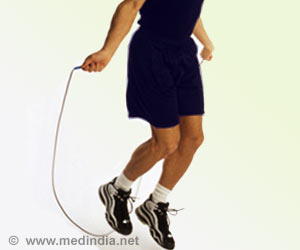The maker of a new product that combines a treadmill and computer workstation is banking on the notion that companies will invest in products like the Walkstation as a way of keeping
Combination of a treadmill and computer workstation may be the new way for employers to ensure optimum fitness levels in employees and keep healthcare costs down, according to the maker of one such machine.
The device allows people to work on their computers while walking on a treadmill at a slow speed of up to three kilometers (two miles) per hour, enabling small amounts of movement that supporters say have the potential to reap big health benefits.The product made by Details, a unit of Michigan-based office furniture maker Steelcase, is selling 30 to 40 units per week, according to company president Bud Klipa.
"The reaction has been overwhelmingly positive, we have numerous repeat customers," Klipa told AFP.
Products and services such as these are part of the future workplace in America and elsewhere as companies try to battle obesity and cap medical costs, according to John Challenger, chief executive of the consultancy Challenger Gray & Christmas.
"Companies are recognizing they have to find a way to get control of their health care costs," Challenger said.
"They are trying to ensure that the unhealthy people are not penalizing the healthy people, so companies are embarking on much more comprehensive wellness programs to get at the health care crisis up front."
Advertisement
Levine argues that the Walkstation provides benefits through a process he calls "non-exercise activity thermogenesis" or NEAT, or incremental movements without strenuous exercise.
Advertisement
"The Walkstation is not intended to provide a gym-style workout in the office; its purpose is not to cause users to raise their heart rates or work up a sweat," Levine says.
"For office workers, the majority of the workday is spent sitting in front of a computer. The premise of this Walkstation is simply to increase movement while working, and for users to enjoy the health benefits of that movement."
The treadmill, which costs around 4,500 dollars for a base model, never exceeds a speed of three kilometers (two miles) per hour, which according to the manufacturer allows most people to use it for a few hours each day.
Klipa said it will take more research to show whether the Walkstation is cost-effective for companies, but says there is already evidence it can help people lose weight and become fitter.
"Everyone is saying the same thing -- we have to get off our butts and move," Klipa said in a phone interview while on his Walkstation.
"I have been using it for 68 days walked 193 miles (308 kilometers), burned 32,000 calories that I wouldn't have burned and lost 11 pounds (five kilos) and haven't change anything else about my lifestyle."
The device drew the attention of Juliet Rodman, a Washington area personal trainer and dietician who works as a wellness consultant for area corporations.
Rodman consulted the manufacturer to become a sales representative, working to offer the device as part of wellness consulting.
While many firms offer wellness and preventive health programs, Rodman said companies see "a lot of obstacles" to the efforts because people have to take time off from work for fitness or testing programs.
"We want to sell (companies) solutions and the Walkstation is a tool to help them bring healthy habits to work," she said.
"People can work and move at the same time and that's the answer."
Source-AFP
RAS/S















